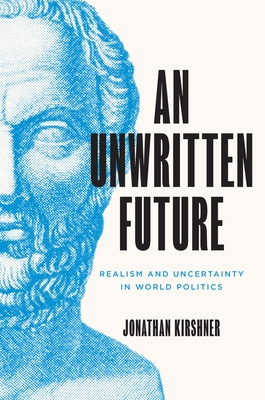

 Princeton University Press
Princeton University Press
An Unwritten Future: Realism and Uncertainty in World Politics


Key Metrics
- Jonathan Kirshner
- Princeton University Press
- Paperback
- 9780691239217
- -
- -
- Political Science > International Relations - General
- English
 Secure Transaction
Secure TransactionBook Description
An argument for the classical realist approach to world politics
An Unwritten Future offers a fresh reassessment of classical realism, an enduring approach to understanding crucial events in the international political arena. Jonathan Kirshner identifies the fundamental flaws of classical realism's would-be successors and shows how this older, more nuanced and sophisticated method for studying world politics better explains the formative events of the past. Kirshner also reveals how this approach is ideally equipped to comprehend the vital questions of the present--such as the implications of China's rise, the ways that social and economic change alter the balance of power and the nature of international conflict, and the consequences of the end of the US-led postwar order for the future of world politics.
Laying out realism's core principles, Kirshner discusses the contributions of the perspective's key thinkers, including Thucydides, Hans Morgenthau, and Raymond Aron, among others. He illustrates how a classical realist approach gives new insights into major upheavals of the twentieth century, such as Britain's appeasement of Nazi Germany and America's ruinous involvement in Vietnam. Kirshner also addresses realism's limits and explores contemporary issues, including the ascent of great power challengers, the political implications of globalization, and the diffusion of power in modern world politics.
A reexamination of the realist tradition, with a renewed emphasis on the crucial roles played by uncertainty, contingency, and contestation, An Unwritten Future demonstrates how a once-popular school of thought provides invaluable insights into pressing real-world problems.
Author Bio
Jonathan Kirshner is Professor of Political Science and International Studies. His research and teaching interests focus on international relations, political economy (especially macroeconomics and money), and politics and film. His current research includes projects on classical realism, the international political implications of the financial crisis and its aftermath, and the politics of mid-century cinema.
Prior to joining Boston College, Kirshner was the Stephen and Barbara Friedman Professor of International Political Economy in the Department of Government at Cornell University. At Cornell, he also served as director of the Reppy Institute for Peace and Conflict Studies from 2007 to 2015, and was the recipient of the Provost’s Award for Distinguished Scholarship and the Stephen and Margery Russell Distinguished Teaching Award.
Recent books include American Power after the Financial Crisis, and Hollywood’s Last Golden Age: Politics, Society and the Seventies Film in America. His first book, Currency and Coercion, explored how states manipulate international monetary relations to advance security-related goals. Another book, Appeasing Bankers: Financial Caution on the Road to War, illustrated how financial interests (such as banks) and international financial markets can shape and constrain states’ grand strategies and influence decisions about war and peace. Appeasing Bankers won the best book award from the International Security Studies Section of the International Studies Association.
Kirshner was the first World Politics Visiting Fellow at Princeton University’s Institute for International and Regional Studies, and was the director of the Economics and National Security Program at the Olin Institute at Harvard University from 2000-04. With Eric Helleiner, he is the co-editor of the multi-disciplinary book series “Cornell Studies in Money,” as well as the books The Great Wall of Money: Power and Politics in China’s International Monetary Relations and The Future of the Dollar.
Source: Boston College
Videos










Community reviews
Write a ReviewNo Community reviews